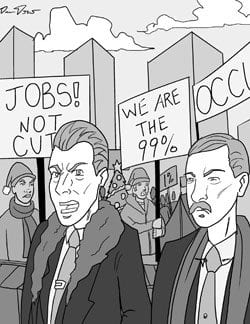
Enlightened self-interests
Only 13 days after Occupy Wall Street took up residence in Zuccotti Park, Occupy Boston encamped in Dewey Square. Until the final unsettling on Dec. 10, Boston residents received constant news accounts of the protest of the 99 percenters. Many of those who are even opposed to the criticism of economic inequality and the influence of lobbyists on government were supportive of the First Amendment right to the freedom of political expression.
Now that the Rose Fitzgerald Kennedy Greenway is being prepared for its vernal splendor, people are wondering whether the disruption was worthwhile. Americans are unaccustomed to protest movements that are both devoid of leaders and a specific goal-oriented agenda. The Occupy movement has forced Americans to inhabit the realm of ideas. For many people, that is not a completely comfortable place.
One idea “We are the 99 percent” that was essentially a movement slogan, will have a great impact on the national psyche. Few ideas have greater impact in the nation than “America is the land of opportunity.” While everyone appreciates the nation’s political freedom, the “American Dream” ideal with greatest appeal is to strike it rich. Until recently, there was a general delusion that everyone can be wealthy.
Ninety-nine percent sticks a hole in that balloon. It confronts Americans with the mathematical reality that only a small percentage of citizens will ever become part of the top 1 percent. That would require annual income of $662,000. Even those fortunate enough to survive through the recent recession have witnessed friends and neighbors caught in the economic maelstrom.
Protestors have been forced to be vague about their objectives because of the complexity of the economic issues. In time they will sort it out. Polls indicate that support for the Tea Party movement has begun to soften, even in areas that elected Tea Party candidates to Congress in 2010. People are beginning to understand that the fiscal austerity of the conservatives does not benefit them. They have been working against their own best interests.
The Occupy movement has focused attention on policy issues that most people usually ignore. The protestors were nonviolent and Mayor Tom Menino and Police Commissioner Edward Davis are to be applauded for not using excessive force to oust the demonstrators from their Dewey Square encampment. The whole effort maintained a level of dignity appropriate for Boston. Nonetheless, the protestors have awakened a sleeping tiger.
They proclaim “We are the 99 percent. Stand up! Fight back!” Now that they have moved inside for winter, everyone awaits their proposals and demands to bring about the change that they assert is needed.
For decades black voters have shunned hyper-conservative Republicans in presidential elections. In 1960 almost one-third of the black electorate voted for Richard Nixon against John F. Kennedy. Four years later, however, the black vote for Barry Goldwater, who opposed the 1964 Civil Rights Act, dropped to only 6 percent. Except for 15 percent for Nixon in 1968 and Gerald Ford in 1976, the black vote for Republicans has remained at little more than 10 percent.
Undoubtedly, white voters are equally attentive to their best interests. When the 99 percenters become organized and publish position papers, voters who are supportive of programs to create greater economic fairness will vote appropriately.
The nation has not heard the last of the Occupy movement, which has done much to set a new focus for public debate.






